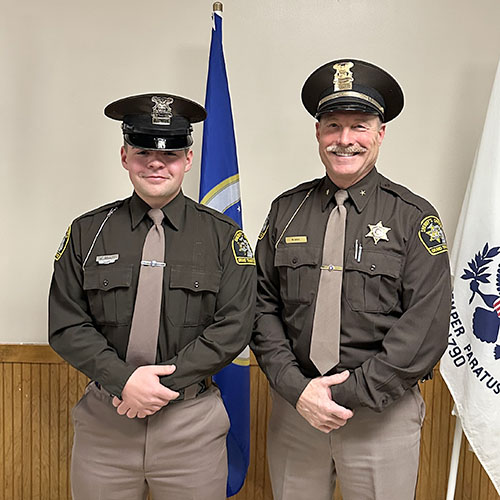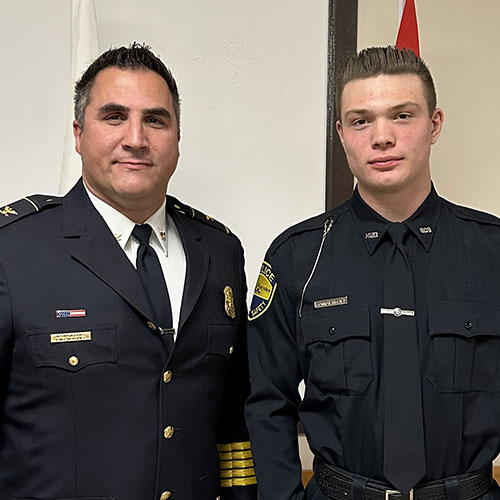Success Story: Police Academy graduates ease officer shortage
December 20, 2023
This holiday season, eight Michigan communities, from the Upper Peninsula to metro Detroit, got a new police or sheriff’s officer faster than ever before, thanks to NMC’s first 16-week condensed Police Academy.
Ten students graduated Dec. 9. Nine of the 10 graduates are employed, or sponsored, recruits whose tuition was paid for through the Michigan Public Safety Academy Assistance Program, established a year ago to help address the critical, statewide need for additional police officers. Simultaneous changes to NMC’s Academy structure, which condensed the program from two semesters to one for students who already hold at least an associate’s degree, are a holiday wish come true for law enforcement agencies.
 Police Academy graduate Andrew Bankey, left, and Grand Traverse County Sheriff Mike Shea, who sponsored him in the Academy.“That creates a potential police officer for us in literally half the time,” said Grand Traverse County Sheriff Mike Shea, whose newest officer, Andrew Bankey, worked his first shift Dec. 15. “We will be able to have that officer in a patrol car the week after he graduates. It is going to help immensely.”
Police Academy graduate Andrew Bankey, left, and Grand Traverse County Sheriff Mike Shea, who sponsored him in the Academy.“That creates a potential police officer for us in literally half the time,” said Grand Traverse County Sheriff Mike Shea, whose newest officer, Andrew Bankey, worked his first shift Dec. 15. “We will be able to have that officer in a patrol car the week after he graduates. It is going to help immensely.”
The other agencies are police departments in Traverse City, Manistee and Farmington Hills, the Escanaba Department of Public Safety, which sent two students, and sheriff’s offices in Manistee, Antrim and Benzie counties.
Graduation meant Manistee Police Chief Josh Glass was able to fill one of his three current vacancies. Connor Rischel is the first sponsored recruit Glass has had in his 20-year career. Like Shea, Glass said the 16-week schedule made it possible.
 Manistee Police Chief Josh Glass, left, and his employed recruit Connor Rischel.“It gets the person up and running and impacts the services we provide our community,” Glass said. “Not as many people are entering our profession.”
Manistee Police Chief Josh Glass, left, and his employed recruit Connor Rischel.“It gets the person up and running and impacts the services we provide our community,” Glass said. “Not as many people are entering our profession.”
Glass praised the Police Academy curriculum under the leadership of Director Gail Kurowski, who has led a shift to scenario-based training, which simulates real-world situations. The Michigan Commission on Law Enforcement Standards (MCOLES), sets a minimum threshold for such training that NMC far exceeds.
“Whenever possible, we will teach the MCOLES training modules with scenario-based instruction,” said Kurowski, who expects another class of ten, eight of whom are sponsored, to start in January. At least two of those will be Shea’s recruits.
“I’m cautiously optimistic that we have turned a corner, at least locally,” said Shea, who graduated from NMC in 2005 himself. “Between people in the hiring process and/or being sponsored, I believe we will have all of our current vacancies accounted for.”
Law enforcement agencies are eligible for up to $20,000 per recruit for tuition and other training costs, plus $4,000 in salary from the assistance program. Nearly $14 million of the original $30 million appropriated is already spent.
Shea said employed recruits also sign a four-year agreement to stay with the Grand Traverse Sheriff’s office.
“There’s a little retention incentive as well,” he said.
For more information on NMC’s program, visit nmc.edu/police.
Want more stories like this?
NMC students past and present are achieving success in the classroom and in their careers. This section showcases just a few examples.
Sign up for NMC Now to get these stories, plus upcoming campus events and media mentions, delivered to your inbox every other Wednesday. View past issues here.